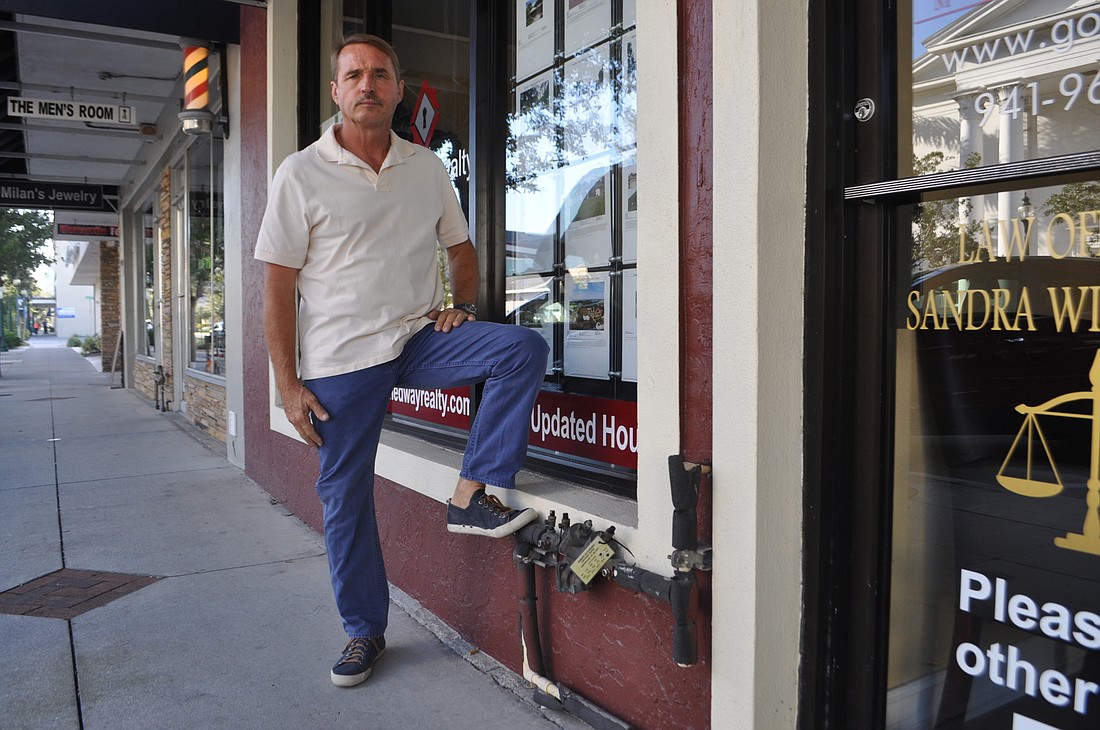- July 26, 2024
-
-
Loading

Loading

As Devin Rutkowski tells it, a scourge is taking over the sidewalks of the city, infecting vital areas such as St. Armands Circle and downtown Sarasota.
The culprit? Backflow preventers, a device designed to avoid the pollution of the city’s water supply. Although the less perceptive might overlook the metallic pipes, Rutkowski has a grim prediction about the impact the city’s current regulatory policy will have on its shopping districts.
“We will be the laughing stock of the state of Florida,” Rutkowski said at the Oct. 13 St. Armands Business Improvement District meeting. “It defies logic.”
During the past 10 days, Rutkowski has made similar appeals at City Commission, Downtown Improvement District and Historic Preservation Board meetings. Months of research have led him to the conclusion that, at best, the city’s backflow preventer rules are cluttering up commercial areas.
From Jan. 1 to Sept. 29, the city sent 1,942 letters to water customers regarding backflow prevention. That includes more than 120 Main Street addresses within the downtown core, and another 20 in the commercial district of St. Armands Circle.
Since 2011, the city has required all commercial and some residential water customers to install a backflow preventer. Customers who receive a notice have 60 days to add the devices, which can range from several hundred to several thousand dollars. If a customer doesn’t comply, the city eventually shuts off his water.
From 2006-2011, the city ensured more than 2,000 water users with potential cross-connections added the devices. The new ordinance sought to bring everyone else into compliance.
The City Commission approved a revision to those regulations this March. The changes came in response to the Florida Department of Environmental Protection’s new rules governing cross-connection control, less strict than the 2011 proposed rules.
The revised ordinance relaxed the standards for residential water customers but kept the provision that all commercial customers must install a backflow preventer.
The state outlines the categories of customers for which backflow prevention is required, such as car washes, hospitals and mortuaries. Rutkowski wants the city to stop mailing the letters and revisit its current policy.
“I submit to you a dress shop, a real estate office, an architect, an attorney is not what the Florida Administrative Code had in mind,” Rutkowski said.
City Utilities Director Mitt Tidwell said the stricter regulations are a precautionary measure. Business types such as beauty salons or laundromats do pose a hazard, and the city wants to prevent a risky business from opening without a backflow preventer already in place.
"We could go from a lawyer’s office, which is low-hazard, to a different type of esablishment that is a high hazard." — Mitt Tidwell
“We may not be aware of a change of use when it happens,” Tidwell said. “So we could go from, say, a lawyer’s office — which is low-hazard — to a different type of establishment that is a high hazard that absolutely requires a backflow preventer.”
When approached, the city has worked with businesses to conceal the devices to whatever degree possible. If the commission wanted to revisit the regulations, Tidwell said he would not object, and any decision came down to a question of priorities.
“How well do you want your drinking water protected?” Tidwell said. “If you don’t put in the device and there’s a backflow, is that a risk you’re willing to take?”
The St. Armands and downtown groups offered support for Rutkowski’s push to get the city to reconsider its regulations. At the Downtown Improvement District meeting, city Chief Planner Steve Stancel said he agreed with Rutkowski’s argument.
Rutkowski believes, now that the public is more aware of the significance of the cross-connection ordinance, water users would happily advocate for less stringent regulations. Based on his outreach so far, his message is resonating with many residents.
“It’s something that popped up under the radar screen for me — I didn’t realize this thing was happening,” DID Chairman Mark Kauffman said at a meeting Tuesday. “We will take what action we can.”
Update: An earlier version of this article identified Rutkowski as an owner of the Blue Rooster, and has been updated to reflect that he is a former co-owner.